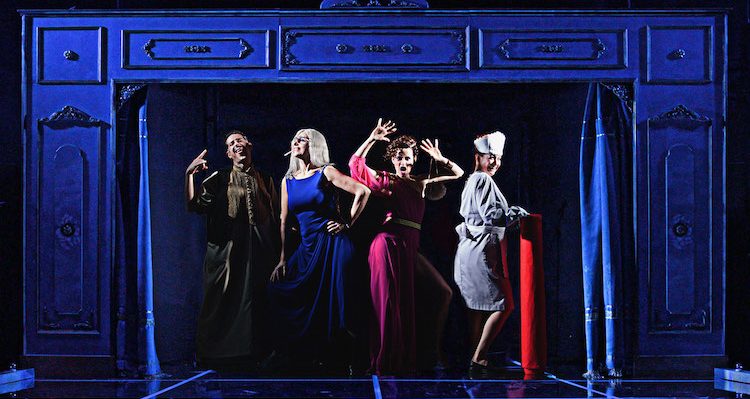
“In Cádiz where I was born there was a place I loved called Palacio de la Moda. You’d go in and there were mirrors everywhere: on the walls, on the ceiling. You drowned in the spectacle of yourself.”
José Troncoso is director of La Estampida, a Spanish theatre collective that burst onto the scene eight years ago with the unflinching yet adorable hit Las Princesas del Pacífico. Subsequent acclaimed pieces propelled the youthful troupe to win last year’s Premio Crítico de Teatro 2020.
Clickbait fame
But fame, as the cliché goes, comes at a cost and in an attempt to meet and subvert their success, La Estampida have gone all out on a new piece, La Cresta de la Ola, a black comedy that premiered in Madrid last autumn. The title refers to being at the very pinnacle of fame; no longer the 15 minutes that it once was, but a mere moment of suspension (and hopefully an Instagram to show for it) after which it all comes crashing down.
Spanish movies
The aesthetic draws on 1990s Spanish movies which revelled in the decadence of a decade that descended into a carousel of corruption scandals and financial crises. Set in a nightclub garnished with gold-sprayed palm trees, withstanding blasts of obnoxious techno, the cast play a catwalk of louder-than-life caricatures, all of who desire to be someone different.
Long plastic nails
Victoria (Alicia Rodríguez), a cleaner, wants to be Estella (Ana Turpin), a celebrity; Victoria’s Moroccan husband Jacinto (José Bustos) chronically worries about belonging; the delightful Eugenia (Belén Ponce de León), a mournful middle-aged drinker with an ironed Corte Inglés bag attached to her forearm, leeches off Estella, who, predicting her own star soon will fall, clings to Eugenia as a reassuring comparison.
Palacio de la Moda
“We wanted to interrogate success, what it is and what it does to us, at a time when La Estampida is feeling the pressure of other people’s high expectations,” says Troncoso. The resulting piece, though somewhat panicky, reflects the intensity of the last few years, when personal dissatisfaction duplicated worldwide. Like the mirror effect of Palacio de la Moda, says Troncoso, “confinement caused us to think way more about our lives than is good for us.”
La Cresta de la Ola
Teatre Nacional de Catalunya
until 28 November
in Spanish
Image © Susana Martin
